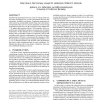Free Online Productivity Tools
i2Speak
i2Symbol
i2OCR
iTex2Img
iWeb2Print
iWeb2Shot
i2Type
iPdf2Split
iPdf2Merge
i2Bopomofo
i2Arabic
i2Style
i2Image
i2PDF
iLatex2Rtf
Sci2ools
CIDR
2011
2011
Consistency Analysis in Bloom: a CALM and Collected Approach
Distributed programming has become a topic of widespread interest, and many programmers now wrestle with tradeoffs between data consistency, availability and latency. Distributed transactions are often rejected as an undesirable tradeoff today, but in the absence of transactions there are few concrete principles or tools to help programmers design and verify the correctness of their applications. We address this situation with the CALM principle, which connects the idea of distributed consistency to program tests for logical monotonicity. We then introduce Bloom, a distributed programming language that is amenable to high-level consistency analysis and encourages order-insensitive programming. We present a prototype implementation of Bloom as a domain-specific language in Ruby. We also propose a program analysis technique that identifies points of order in Bloom programs: code locations where programmers may need to inject coordination logic to ensure consistency. We illustrate th...
| Added | 25 Aug 2011 |
| Updated | 25 Aug 2011 |
| Type | Journal |
| Year | 2011 |
| Where | CIDR |
| Authors | Peter Alvaro, Neil Conway, Joe Hellerstein, William R. Marczak |
Comments (0)

